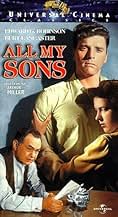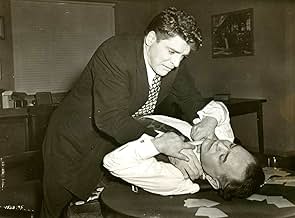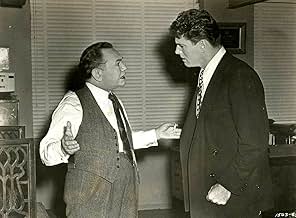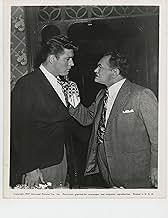VALUTAZIONE IMDb
7,3/10
2586
LA TUA VALUTAZIONE
Durante la Seconda Guerra Mondiale, l'industriale Joe Keller commette un crimine e inganna il suo socio Herbert Deever ma anni dopo il suo peccato torna a tormentarlo.Durante la Seconda Guerra Mondiale, l'industriale Joe Keller commette un crimine e inganna il suo socio Herbert Deever ma anni dopo il suo peccato torna a tormentarlo.Durante la Seconda Guerra Mondiale, l'industriale Joe Keller commette un crimine e inganna il suo socio Herbert Deever ma anni dopo il suo peccato torna a tormentarlo.
- Regia
- Sceneggiatura
- Star
- Premi
- 2 vittorie e 2 candidature totali
Harry Morgan
- Frank Lubey
- (as Henry Morgan)
Margaret Bert
- Townswoman
- (non citato nei titoli originali)
Walter Bonn
- Jorgenson
- (non citato nei titoli originali)
Helen Brown
- Mrs. Hamilton
- (non citato nei titoli originali)
Pat Flaherty
- Bartender
- (non citato nei titoli originali)
Jack Gargan
- Workman
- (non citato nei titoli originali)
Harry Harvey
- Judge
- (non citato nei titoli originali)
Jerry Hausner
- Halliday
- (non citato nei titoli originali)
Herbert Heywood
- McGraw
- (non citato nei titoli originali)
Recensioni in evidenza
A standard 1940s group of ensemble players, coupled with the strength of an Arthur Miller project. All cast principles and minor players were at the top of their forms when they stood before the cameras. None were noted as powerful stage actors in their own right. Yet when they appeared in this film, they succeeded in doing what I think a significant stage work should do. Carry the viewer into the stage (not film) theater, and give them the unique experience of a Broadway or Off-Broadway theater seat.
The production style and direction (for reasons of cost and utility) let the words of Miller's play take center stage. In beautiful black-and-white, the Art and Set direction are spare, firm, and commanding. They command our attention. Miller is big on attention to the issues his characters are grappling with and their impact on the significant issues of our (and all) time.
As Miller repeats in Death of a Salesman, there are layers of meaning and understanding between his characters and the issues they confront internally and externally. The two business partners have had a long, intimate family relationship (like Cain and Able). So close a connection that his son could have married his partner's daughter. And she, of course, is the only one who has always known (from that son) the truth about the son's death. And the fact (s) about the father.
Miller shows us that the father's Horatio Alger lies are at the foundation of who we are individually and collectively as Americans; the lies can almost thoroughly wash out what individuals and a community should think about its leading citizens. It is an interesting plot twist that, as Miller's script points out, the low-class birth and poverty of the father embed him into the fabric of the community.
That the film faithfully carried Miller's message of contempt and loathing not only for the worship of that false god(capitalism) but also for the whole Horatio Alger hero myth (that both American liberals and conservatives embrace) is quite daring. Even for a film world that had not yet descended into the long night of the "Black List."
The production style and direction (for reasons of cost and utility) let the words of Miller's play take center stage. In beautiful black-and-white, the Art and Set direction are spare, firm, and commanding. They command our attention. Miller is big on attention to the issues his characters are grappling with and their impact on the significant issues of our (and all) time.
As Miller repeats in Death of a Salesman, there are layers of meaning and understanding between his characters and the issues they confront internally and externally. The two business partners have had a long, intimate family relationship (like Cain and Able). So close a connection that his son could have married his partner's daughter. And she, of course, is the only one who has always known (from that son) the truth about the son's death. And the fact (s) about the father.
Miller shows us that the father's Horatio Alger lies are at the foundation of who we are individually and collectively as Americans; the lies can almost thoroughly wash out what individuals and a community should think about its leading citizens. It is an interesting plot twist that, as Miller's script points out, the low-class birth and poverty of the father embed him into the fabric of the community.
That the film faithfully carried Miller's message of contempt and loathing not only for the worship of that false god(capitalism) but also for the whole Horatio Alger hero myth (that both American liberals and conservatives embrace) is quite daring. Even for a film world that had not yet descended into the long night of the "Black List."
ALL MY SONS may have been slightly diluted for the screen as compared to the stage play which implicated corruption and wartime profiteering on a higher level than just one or two business men, but it's still powerful stuff and extremely well directed by Irving Reis. Individual scenes have a strength that is impressive, largely due to the excellent central performances of BURT LANCASTER, EDWARD G. ROBINSON and MADY CHRISTIANS. Robinson, in particular, makes the most of a meaty role that has him cocky and confident one moment, then bruised and bitter the next as his past crimes catch up with him--and his conscience.
Seems that during WWII, he and his partner (FRANK CONROY) were pressured to finish making cylinder parts for airplanes on the government's tight schedule and knowingly sent defective parts which caused the death of twenty-one pilots when their planes went down. Robinson has been hiding the truth from himself and his neighbors ever since, concerned only with making a decent living for himself and his family in suburban America.
Conflicts arise when others around him begin to question his role in the crime that sent his partner to jail. The son of the jailed partner, played in rather stiff fashion by HOWARD DUFF, is unforgiving when he realizes Robinson shared the guilt with his father and yet let his father take the blame for the incident. Lancaster, too, and his girlfriend (LOUISA HORTON) who happens to be Duff's sister, also bring the conflicts into the open when they start asking for answers and probing for the truth. Horton is rather colorless in what is meant to be a sympathetic role and spent her remaining years in TV roles.
But it's EDWARD G. ROBINSON who makes the biggest impression as the father, proud of his achievements and obviously in denial until his son, Lancaster, makes him realize why his other son never returned from the war--which leads to a tragic ending.
Summing up: Somber drama never quite overcomes its stage origins but it's still powerful stuff.
Trivia note: The only implausible factor in the casting--the physical impossibility of BURT LANCASTER as Robinson's son, when he bears no physical resemblance whatsoever to Eddie--nor Mady Christians for that matter!
Seems that during WWII, he and his partner (FRANK CONROY) were pressured to finish making cylinder parts for airplanes on the government's tight schedule and knowingly sent defective parts which caused the death of twenty-one pilots when their planes went down. Robinson has been hiding the truth from himself and his neighbors ever since, concerned only with making a decent living for himself and his family in suburban America.
Conflicts arise when others around him begin to question his role in the crime that sent his partner to jail. The son of the jailed partner, played in rather stiff fashion by HOWARD DUFF, is unforgiving when he realizes Robinson shared the guilt with his father and yet let his father take the blame for the incident. Lancaster, too, and his girlfriend (LOUISA HORTON) who happens to be Duff's sister, also bring the conflicts into the open when they start asking for answers and probing for the truth. Horton is rather colorless in what is meant to be a sympathetic role and spent her remaining years in TV roles.
But it's EDWARD G. ROBINSON who makes the biggest impression as the father, proud of his achievements and obviously in denial until his son, Lancaster, makes him realize why his other son never returned from the war--which leads to a tragic ending.
Summing up: Somber drama never quite overcomes its stage origins but it's still powerful stuff.
Trivia note: The only implausible factor in the casting--the physical impossibility of BURT LANCASTER as Robinson's son, when he bears no physical resemblance whatsoever to Eddie--nor Mady Christians for that matter!
... in that in most noirs you see the dilemma up front in its compexity and completion. And then you watch the protagonist stumble through a series of decisions in which the noose just tightens.
Here the opening scenes are middle class and almost mundane and so post war. A son (Burt Lancaster) has returned from war and is planning to marry the girl of his dead brother, killed in the war. The living son's mother can't deal with the fact that her dead son is indeed dead - he died on an aerial mission and his body was never recovered. And thus she is not very supportive of this prospective union.
But this film turns out not to be about war and remembrance and the new middle class at all. Instead it is about a deed past done, and apparently the perpetrator has gotten away with it, and only as the film wears on are all of the secrets revealed, as well as the real reason the mother cannot accept her son's death.
Edward G. Robinson is terrific as the father who is living the American dream after being set out on the sidewalks by his own family since the age of ten. Lancaster with his beaming smile and his head full of bushy hair would look at home in a collegiate letter jacket, and this is a good early showcase for his talents. Harry Morgan appears in a minor role as one of the fathers of the ongoing baby boom.
I haven't said much here about what is really the conflict in this film, because I don't want to give anything away. However, it is a great film about moral conflict versus friend and family and even patriotic obligations, and it is a shame it is so obscure.
Here the opening scenes are middle class and almost mundane and so post war. A son (Burt Lancaster) has returned from war and is planning to marry the girl of his dead brother, killed in the war. The living son's mother can't deal with the fact that her dead son is indeed dead - he died on an aerial mission and his body was never recovered. And thus she is not very supportive of this prospective union.
But this film turns out not to be about war and remembrance and the new middle class at all. Instead it is about a deed past done, and apparently the perpetrator has gotten away with it, and only as the film wears on are all of the secrets revealed, as well as the real reason the mother cannot accept her son's death.
Edward G. Robinson is terrific as the father who is living the American dream after being set out on the sidewalks by his own family since the age of ten. Lancaster with his beaming smile and his head full of bushy hair would look at home in a collegiate letter jacket, and this is a good early showcase for his talents. Harry Morgan appears in a minor role as one of the fathers of the ongoing baby boom.
I haven't said much here about what is really the conflict in this film, because I don't want to give anything away. However, it is a great film about moral conflict versus friend and family and even patriotic obligations, and it is a shame it is so obscure.
I saw this movie today for the umpteenth time and it finally occurred to me... Weren't both men to blame? Wasn't Herbert Deever really just as guilty as Joe Keller? No matter who "says" they are responsible, anyone involved in knowingly shipping faulty parts that could kill people is responsible. Deever shouldn't have sent them out, no matter what he was told. Isn't that what all those Nazis claimed when asked how they could commit so many atrocities? "I was just taking orders." That doesn't wash with me or with most people. We all have a responsibility to follow our own consciences with regard to right and wrong.
They were both guilty....
It's a wonderful story and very well performed and written, but that fact remains to be discussed.
They were both guilty....
It's a wonderful story and very well performed and written, but that fact remains to be discussed.
The movie version of Arthur Miller's All My Sons is yet another excellent example of how a fairly dreadful play can make a watchable, even beautiful film. In its day quite relevant, the play now reeks of the stuffily leftish Old Testament pieties of the Group Theatre of the thirties, and in style, if not content, anticipates the think-piece, more mainstream television dramas of the fifties. The plot is worth going into only briefly, and concerns a morally corrupt though not innately bad manufacturer of aircraft parts whose cost-cutting was responsible for the crashing of several planes during the then recent Second World War. Set in what appears to be either a New York suburb or a leafy section of one of the city's outer boroughs, the films is beautifully photographed and designed. It isn't quite realistic, as it is obviously a studio product, but it is far less artificial-looking than most movies of the period, and is singularly evocative in every detail of a way of middle class life, leisurely and informal, egalitarian and yet conscious of social distinctions, that has long passed into history. Beautifully rendered also is the large, very comfortable house in and around which much of the film takes place. Not quite a mansion, it is nevertheless roomy and in its way elegant, of Victorian vintage or nearly so. We get to see so much of it. The dining room, with its fluffy, lacey things all about; the heavy soup bowls and plates decorated with vines and flowers; and in its somwhat retro feeling it appears, like the family itself, both vaguely European and wholesomely American. Everything in the house seems heavy and solid, nailed down, as it were, as if this way of life was going to go on forever. The scenes in the backyard show the lazy, hazy summer afternoons of lemonade and hammocks, before the arrival of television, interstate highways, and shopping malls. Overall the picture is so brilliantly and minutely detailed, whether the set is a restaurant or a factory, that it is astonishing that it didn't win the Academy Award for set design. The action, consisting mostly of people either arguing with one another, lying, or expressing strong emotions, like love and hate, is very well presented and framed within the various settings. None of the actors in the film, including a young Burt Lancaster, is at his absolute best, though Edward G. Robinson, as the paterfamilas, in snugly in his element here, and quite credible, if not moving. There's a cockiness to Robinson which, though quite charming in certain roles, works against pathos or sympathy of any kind. Thus, in the end, the film is strangely fails to tug at the heartstrings, so to speak; it worked better in the earlier scenes, before the story built a head of steam. A few behind the scenes things are worth mentioning, not the least of which director Irving Reis, whose orchestration of this and several other films of the period showed great potential. Like Robert Wise, Mark Robson, John Sturges, Edward Dmytryk and Jules Dassin, Reis was a strong up-and-comer in the Hollywood pecking order of directors of the time, and was, sadly, to die just a few years later. Mady Christians, who plays Robinson's foreign-born wife, was blacklisted shortly after the film came about. All My Sons was one of the films that was presumably going to launch its studio, the newly reorganized Universal-International, into the big leagues. It didn't, but that's another story.
Lo sapevi?
- QuizThe original Broadway production of "All My Sons" opened at the Coronet Theater in New York on January 29, 1947. It ran for 328 performances, and won the 1947 Best Play Tony Award for author Arthur Miller. His original script was used as the basis for this movie's screenplay.
- BlooperWhen Joe comes out of the house upon Annie's arrival, he comes down the front steps and walks into the yard with his arms raised. In the next instant, he's back at the steps and his arms are down.
- Citazioni
Jim Bayliss: Put her to bed, Joe. Both of you go to bed. Staying up won't help; sleep will. Sleep's a wonderful thing, the best thing about living.
- ConnessioniFeatured in Film Preview: Episodio #1.1 (1966)
I più visti
Accedi per valutare e creare un elenco di titoli salvati per ottenere consigli personalizzati
- How long is All My Sons?Powered by Alexa
Dettagli
- Data di uscita
- Paese di origine
- Siti ufficiali
- Lingua
- Celebre anche come
- All My Sons
- Luoghi delle riprese
- Santa Rosa, California, Stati Uniti(the Grace home on McDonald Avenue)
- Azienda produttrice
- Vedi altri crediti dell’azienda su IMDbPro
- Tempo di esecuzione1 ora 34 minuti
- Colore
- Proporzioni
- 1.37 : 1
Contribuisci a questa pagina
Suggerisci una modifica o aggiungi i contenuti mancanti

Divario superiore
By what name was Erano tutti miei figli (1948) officially released in India in English?
Rispondi

































